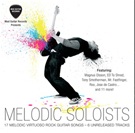How To Avoid Bad Guitar Advice: Interview And Review With Tom Hess
 Do you have the habit of looking through Google or YouTube trying to find good guitar advice? If so, you are like almost every guitar player these days. Most guitarists get nearly all of their information for learning guitar directly from the internet. However, the internet is of course full of both people who ‘know’ what they are talking about, and people who merely repeat anything they are told. That said, it can often be very difficult to understand the difference between good and bad guitar advice if you are not already a great guitarist.
Do you have the habit of looking through Google or YouTube trying to find good guitar advice? If so, you are like almost every guitar player these days. Most guitarists get nearly all of their information for learning guitar directly from the internet. However, the internet is of course full of both people who ‘know’ what they are talking about, and people who merely repeat anything they are told. That said, it can often be very difficult to understand the difference between good and bad guitar advice if you are not already a great guitarist.
The truth is, a great deal of the advice offered in online guitar playing communities, comments on music blogs, or amateur guitar videos can actually do more harm than good. After spending a great deal of time working on a guitar related project, I decided to seek additional information through the advice of Tom Hess, pro guitar player and member of Rhapsody Of Fire. After talking for a while, I decided it would be useful to make the interview into an official “Tom Hess review” from which other guitar players could gain value. Read Tom’s review below to see what was discussed:
Guitar Playing Myth Number.1:
Ryan Buckner: What do you think about this common line of thinking Tom?: “The key to learning new things for guitar is practicing them in isolation until you have reached a level of mastery.”
Tom Hess review of this guitar playing advice:
Tom Hess: Initially, this style of thinking makes a lot of sense. Of course, you WILL have to practice new ideas on guitar on their own in order to progress with them. However, the issue with this approach is that it has a very narrow and limited focus.
The truth is, when you begin learning a new chord, scale or technique on guitar, you do not learn it simply for the sake of the skill itself. Instead, you want to know how you can use this skill in order to create nice sounding music (whether you are aware of this or not). As an example, think of most metal guitarists who want to play lead guitar. In most cases, these guitar players learn how to play scales or arpeggios at high speeds; however, when it comes time for them to actually APPLY what they know into real music, they have no idea what to do. Of course, these guitar players did not learn to play fast merely for the sake of playing fast. They simply wanted to play the great music of their favorite guitar players who just so happen to play fast or technical music. In order to get the most out of the new skills you develop on guitar, you must learn how to put everything together and apply it creatively in a musical manner. By doing this, you will be able to put what you learn in isolation into good use and avoid having a bunch of disconnected guitar skills that cannot help you make good music on their own.
Guitar Playing Myth Number.2:
Ryan: “Never practice guitar without a metronome.”…What do you have to say about this common advice?
Tom Hess review of this guitar playing advice:
Tom: A lot of guitar players assume that using a metronome is essential to making progress as they practice. Many of these guitar players will praise the metronome as a tool that has helped them become faster and better at guitar technique.
In reality, you can use a metronome to effectively improve your guitar playing in some (but not all) areas of your playing. However, many guitar players do not truly understand how it should be used to get the best results from their guitar practice.
For instance, if you were use a metronome to build your guitar speed, you would see very limited results at best. This is because using a metronome actually has NOTHING to do with “building” speed on the guitar (or learning new techniques, for that matter). These areas of your guitar playing are improved by understanding and mastering the small movements you make in your hands at slow speeds without a metronome. The metronome should then be used as a tool to check up on your progress, rather than as something that will enable you to play faster on guitar.
Guitar Playing Myth Number.3:
Ryan: What do you have to say to those who believe that learning guitar on your own will get you faster results than working with a guitar teacher?
Tom Hess review of this guitar playing advice:
Tom: If I were to choose one of the worst pieces of commonly given guitar advice, this one would be one of them. Why? If you do not work together with a guitar teacher, you will waste endless hours practicing guitar exercises and techniques that don’t really help you reach your goals. On top of that, most guitar players who learn on their own are completely unaware of their guitar playing goals in the first place. As a result, guitar practice becomes an increasingly frustrating task with no real sense of direction. By choosing to work with a good guitar teacher, you gain all the insight of someone who has already accomplished the guitar playing goals you want to achieve. This will help you to establish and achieve your musical goals in a much shorter period of time than if you were merely learning on your own.
To get the most benefit from working together with a guitar teacher, you must seek out someone who can demonstrate clear PROOF of his ability to get results for his guitar students.
Guitar Playing Myth Number.4:
Ryan: A lot of guitarists subscribe to the belief that becoming a fast guitar player comes from starting slow and slowing building up to speed. What are your thoughts on this approach?
Tom Hess review of this guitar playing advice:
Tom: This particular guitar advice needs more context in order to be truly useful. The method of practicing slowly in order to build speed is ‘one’ approach for becoming a fast guitarist. However, this will only produce limited results for most guitarists because they do not have a speed building strategy in place to help them reach their guitar goals. In order to quickly increase your guitar playing speed, you must first determine your highest speed related goals, and then create an effective strategy that employs several methods to help you target different aspects of your guitar playing.
Guitar Playing Myth Number.5:
Ryan: One of the most common beliefs that guitar players have is that you must practice at least five hours a day in order to become a great guitar player. What do you think about this belief Tom?
Tom Hess review of this guitar playing advice:
Tom: A lot of guitar players who are just beginning to improve their skills are told about legendary guitarists who practiced non-stop throughout the day to eventually get to a high level in their playing. They are then lead to believe that in order to get good at guitar, the only way is to take this same path. For guitar players who do not know any better, this advice is very easy to believe. However, in most cases these guitarists end up making progress at a very slow rate because they become overwhelmed with too many practice items. As a result, they become completely lost in their guitar practice and feel frustrated because they are not reaching their musical goals.
The key to making progress in your guitar practice is NOT to simply “practice more”. Instead, you must focus on getting the most out of every second of your practice time (regardless of ‘how much’ time you spend). To get started, it is absolutely essential that you understand your long term guitar playing goals. Without first determining your goals, you will have no real sense of direction in your guitar practice. By doing this, you will easily be able to eliminate anything in your guitar practice that isn’t truly necessary to your progress toward reaching your goals. After you have done this, you need to create a guitar practice schedule that will help you use your practice time as effectively as possible.
Ryan: Thank you Tom for taking the time to talk today. To the readers of this Tom Hess review, learn more about how to become a great guitar player on Tom’s musician development website.
Tom: No problem Ryan, you’re welcome.
About the author:
Ryan Buckner is a professional musician, guitarist and songwriter. He has written many instructional articles on guitar, songwriting and music theory.










